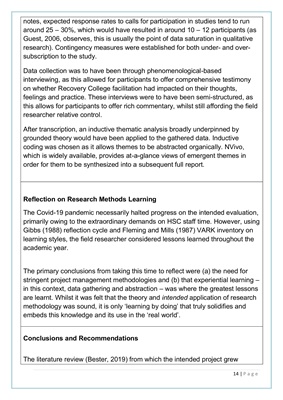
14 | P a g e
Guest, 2006, observes, this is usually the point of data saturation in qualitative
research). Contingency measures were established for both under- and oversubscription
to the study.
Data collection was to have been through phenomenological-based
interviewing, as this allowed for participants to offer comprehensive testimony
on whether RC facilitation had impacted on their thoughts, feelings and practice.
These interviews were to have been semi-structured, as this allows for
participants to offer rich commentary, whilst still affording the field researcher
relative control.
After transcription, an inductive thematic analysis broadly underpinned by
grounded theory would have been applied to the gathered data. Inductive
coding was chosen as it allows themes to be abstracted organically. NVivo,
which is widely available, provides at-a-glance views of emergent themes in
order for them to be synthesised into a subsequent full report.
Reflection on Research Methods Learning
The Covid-19 pandemic necessarily halted progress on the intended evaluation,
primarily owing to the extraordinary demands on HSC staff time. However, using
Gibbs (1988) reflection cycle and Fleming and Mills (1987) VARK inventory on
learning styles, the field researcher considered lessons learned throughout the
academic year.
The primary conclusions from taking this time to reflect were (a) the need for
stringent project management methodologies and (b) that experiential learning -
in this context, data gathering and abstraction - was where the greatest lessons
are learnt. Whilst it was felt that the theory and intended application of research
methodology was sound, it is only 'learning by doing' that truly solidifies and
embeds this knowledge and its use in the 'real world'.
Conclusions and Recommendations
The literature review (Bester, 2019) from which the intended project grew
highlighted a number of key areas that would have been built upon in the
evaluation: these were RCs' impact on patient-practitioner power dynamics,
practitioner attitudes and RCs' relationships with their host organisations. These